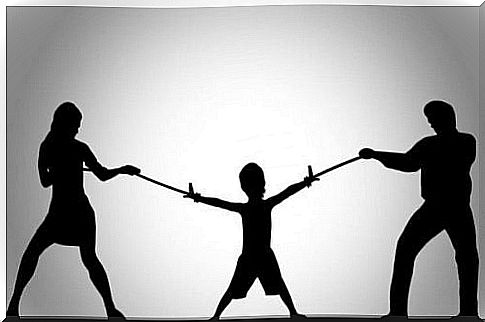What Is Parental Alienation Syndrome?

A divorce or a break-up between the parents is usually very traumatic for the children. Their family is the backbone of their entire lives and now it is breaking. And they can’t do anything about it. They will no doubt feel sad, insecure and very vulnerable. Unfortunately, some parents take advantage of this situation to manipulate and hurt their ex-partner. The result is what we call parental alienation syndrome.
It seems incomprehensible that parents can act in such a selfish way. Unfortunately, sometimes the hatred and resentment towards the ex-partner is stronger than their feelings for the children. Many parents are not even aware of the harm they are inflicting on their children. For them, their own suffering is more important than that of their children.
They will tell the child that his father or his mother does not want to see him. They lie to the child and try to make him lose respect for the other parent. The psychological consequences for the child can become problematic. It can create a pathological hatred for the parent, who is now a victim of parental alienation.
What is Parental Alienation Syndrome?
Parental alienation syndrome is a form of psychological child abuse. It is the manipulation of children’s delicate minds. The goal is to change their perception of the other parent.
This form of abuse can come from one parent or from both parents. The alienating parent will not think twice about making fun of the child when expressing his feelings for the other parent. Many will even use the family environment to reinforce the contempt. Thus, relatives and friends may eventually become accomplices in this form of abuse.

The parent will also discuss in detail the reasons for the separation. He will introduce himself as the victim. With that, he hopes that the child will feel sorry for him and blame the other. It is indeed about revenge. But the tragedy is that the child will suffer the most. The children are the real victims. They should never have to deal with this kind of toxic behavior.
What makes a parent behave this way?
In a divorce situation, this is the right thing people should do. They have to distinguish between two very important concepts. Being a bad partner doesn’t mean someone is a bad parent. Of course, this idea does not apply in situations of domestic violence. It is only natural that when people have been mistreated by their now ex-partner, they fear that history will repeat itself with their children.
In other situations, denying a parent to see their children is almost certainly a sign that the breakup or divorce is not going well. Selfishness and a great lack of self-confidence can fill the parents with ugly thoughts. In addition to the lack of sensitivity and empathy, this is very harmful to the children.
The alienated parent may also have a certain personality disorder. Narcissism and Borderline Personality Disorder are the most common in these situations.

What can I do if I witness this behavior?
If a person is charged with this type of child abuse in court, it can affect custody rights. Before threatening the parent or notifying Child Protective Services, you should try to talk to him or her. Try to make them see that their behavior is anything but appropriate. They must understand that in the end the child will suffer the most.
If their manipulative attitude continues, it’s up to the judge to decide what to do. Children may refuse to live with one parent because the hatred of the other parent has also developed in them. Parental alienation syndrome is a very complex problem. Usually it requires some form of psychological care.
Parental alienation syndrome can be very devastating in children. Anxiety and fear can greatly affect their relationship. They can also hinder their emotional development.
When they express positive feelings for the other parent, they feel ridiculed. This will also affect their self-confidence. Many will carry these traumas into adulthood. They create an irreconcilable gulf between them and the affected parent.
In summary, we can say that we should not take the parental alienation syndrome lightly. A breakup or divorce should not become a psychological battle between those people who at some point in their lives have decided to start a relationship. The children should certainly not be involved. It should not cause any further harm to the children.









